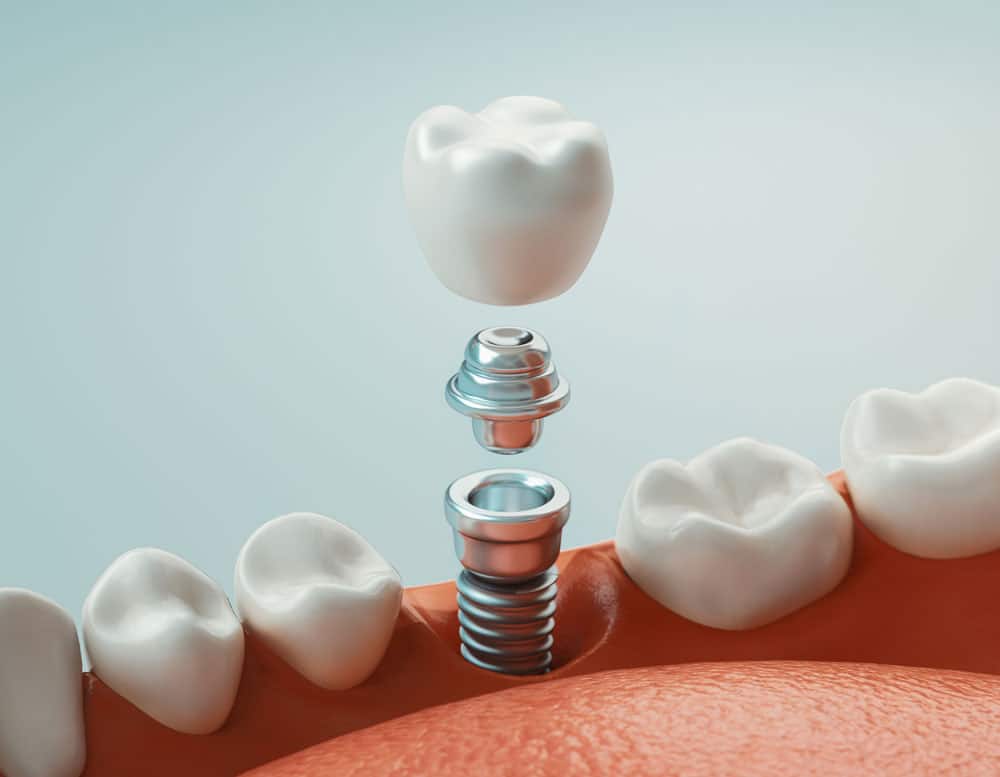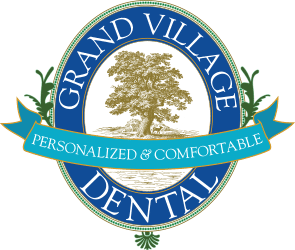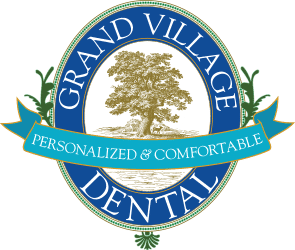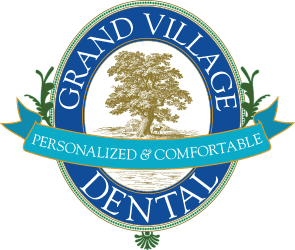
Dental Implants
With today’s modern dental techniques and technologies, dental implants are the best choice for replacing missing teeth and restoring your smile to both beauty and functionality.
Because implanted teeth are fixed in the mouth—rather than being removable, like dentures—they allow a return to much of the comfort and function of natural teeth. Increased chewing ability means you can enjoy more nutritious foods, contributing to your overall health and wellbeing. Dental implants can help prevent future dental problems, especially the gradual bone loss in the jaw associated with missing teeth.
The biggest advantage implants have over dentures is that they’re permanent. Unlike removable dentures or partial dentures, implants do not involve messy adhesives or false teeth getting in the way of speech or eating. Also, because they’re permanent, implants will always be a perfect fit, unlike dentures which may need to be refitted or replaced over time.
What Are Dental Implants?
Dental implants are man-made replacements for natural teeth. The implants themselves are artificial tooth roots made from titanium and are anchored in the gum and jawbone. The implant’s screw-like shape helps it stay in place by providing more surface area for your bone to grow into, a process called osseointegration. Replacement teeth, referred to as crowns, are then permanently secured to these metal implants. They can improve your appearance, boost your self-confidence and allow you to speak with greater clarity than you would with missing teeth or ill-fitting dentures.
What are the quality of life benefits?
01 How long does treatment take?
Depending on your health condition and the type and number of implants you need, the implant procedure can take a day or a total of a few months.
In most cases when only one or a few implants are being placed, the first phase of treatment involves placing the implant in the bone of the jaw and allowing the bone to heal around it. The procedure itself takes 1-2 hours and the healing time can be 3-6 months. Once the dentist is satisfied that the implant is securely healed in place, the crown (i.e. the artificial tooth) will be attached to the implant. This takes one or two visits, depending on the situation.
For patients who are replacing all of their teeth at once, getting implants and prosthetic teeth placed in a single day is possible, though the overall healing time is usually about the same (3 months).
02 How long do implants last?
Our mouths are constantly changing depending on what we eat and drink, our habits and our age. Seeing a dentist regularly is the best way to catch a potential problem before it becomes a big deal. Not to alarm you, but lots of dental conditions don’t necessarily have obvious symptoms that you can rely on to spot something early. Dentists have the expertise and advanced tools to properly examine your oral health in a way that patients simply can’t do for themselves.
Not everyone needs to see the dentist every six months; some patients need to see us more often. Depending on your oral health situation, the dentist will recommend the frequency at which you need to visit us. Some patients see us every three or four months, especially if they have gum disease. If the dentist asks you to come in more frequently than you did in the past, please know that this advice is given with the idea of keeping you healthier in the long run.
Your regular visits are your best chance for keeping your teeth strong, clean and white and your breath fresh. Hygienists can remove stains that regular brushing and flossing and in-home whitening treatments can’t! Plus, we’re always happy to give you refresher training on the best techniques for your at-home oral hygiene routine.
03 Can anyone get implants?
Our mouths are constantly changing depending on what we eat and drink, our habits and our age. Seeing a dentist regularly is the best way to catch a potential problem before it becomes a big deal. Not to alarm you, but lots of dental conditions don’t necessarily have obvious symptoms that you can rely on to spot something early. Dentists have the expertise and advanced tools to properly examine your oral health in a way that patients simply can’t do for themselves.
Not everyone needs to see the dentist every six months; some patients need to see us more often. Depending on your oral health situation, the dentist will recommend the frequency at which you need to visit us. Some patients see us every three or four months, especially if they have gum disease. If the dentist asks you to come in more frequently than you did in the past, please know that this advice is given with the idea of keeping you healthier in the long run.
Your regular visits are your best chance for keeping your teeth strong, clean and white and your breath fresh. Hygienists can remove stains that regular brushing and flossing and in-home whitening treatments can’t! Plus, we’re always happy to give you refresher training on the best techniques for your at-home oral hygiene routine.
04 What are mini dental implants?
Our mouths are constantly changing depending on what we eat and drink, our habits and our age. Seeing a dentist regularly is the best way to catch a potential problem before it becomes a big deal. Not to alarm you, but lots of dental conditions don’t necessarily have obvious symptoms that you can rely on to spot something early. Dentists have the expertise and advanced tools to properly examine your oral health in a way that patients simply can’t do for themselves.
Not everyone needs to see the dentist every six months; some patients need to see us more often. Depending on your oral health situation, the dentist will recommend the frequency at which you need to visit us. Some patients see us every three or four months, especially if they have gum disease. If the dentist asks you to come in more frequently than you did in the past, please know that this advice is given with the idea of keeping you healthier in the long run.
Your regular visits are your best chance for keeping your teeth strong, clean and white and your breath fresh. Hygienists can remove stains that regular brushing and flossing and in-home whitening treatments can’t! Plus, we’re always happy to give you refresher training on the best techniques for your at-home oral hygiene routine.
05 What kind of care do implants require?
Our mouths are constantly changing depending on what we eat and drink, our habits and our age. Seeing a dentist regularly is the best way to catch a potential problem before it becomes a big deal. Not to alarm you, but lots of dental conditions don’t necessarily have obvious symptoms that you can rely on to spot something early. Dentists have the expertise and advanced tools to properly examine your oral health in a way that patients simply can’t do for themselves.
Not everyone needs to see the dentist every six months; some patients need to see us more often. Depending on your oral health situation, the dentist will recommend the frequency at which you need to visit us. Some patients see us every three or four months, especially if they have gum disease. If the dentist asks you to come in more frequently than you did in the past, please know that this advice is given with the idea of keeping you healthier in the long run.
Your regular visits are your best chance for keeping your teeth strong, clean and white and your breath fresh. Hygienists can remove stains that regular brushing and flossing and in-home whitening treatments can’t! Plus, we’re always happy to give you refresher training on the best techniques for your at-home oral hygiene routine.
06 How much do implants cost?
Our mouths are constantly changing depending on what we eat and drink, our habits and our age. Seeing a dentist regularly is the best way to catch a potential problem before it becomes a big deal. Not to alarm you, but lots of dental conditions don’t necessarily have obvious symptoms that you can rely on to spot something early. Dentists have the expertise and advanced tools to properly examine your oral health in a way that patients simply can’t do for themselves.
Not everyone needs to see the dentist every six months; some patients need to see us more often. Depending on your oral health situation, the dentist will recommend the frequency at which you need to visit us. Some patients see us every three or four months, especially if they have gum disease. If the dentist asks you to come in more frequently than you did in the past, please know that this advice is given with the idea of keeping you healthier in the long run.
Your regular visits are your best chance for keeping your teeth strong, clean and white and your breath fresh. Hygienists can remove stains that regular brushing and flossing and in-home whitening treatments can’t! Plus, we’re always happy to give you refresher training on the best techniques for your at-home oral hygiene routine.
07 How are implants better than bridges?
Our mouths are constantly changing depending on what we eat and drink, our habits and our age. Seeing a dentist regularly is the best way to catch a potential problem before it becomes a big deal. Not to alarm you, but lots of dental conditions don’t necessarily have obvious symptoms that you can rely on to spot something early. Dentists have the expertise and advanced tools to properly examine your oral health in a way that patients simply can’t do for themselves.
Not everyone needs to see the dentist every six months; some patients need to see us more often. Depending on your oral health situation, the dentist will recommend the frequency at which you need to visit us. Some patients see us every three or four months, especially if they have gum disease. If the dentist asks you to come in more frequently than you did in the past, please know that this advice is given with the idea of keeping you healthier in the long run.
Your regular visits are your best chance for keeping your teeth strong, clean and white and your breath fresh. Hygienists can remove stains that regular brushing and flossing and in-home whitening treatments can’t! Plus, we’re always happy to give you refresher training on the best techniques for your at-home oral hygiene routine.


